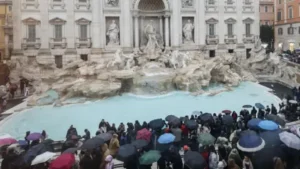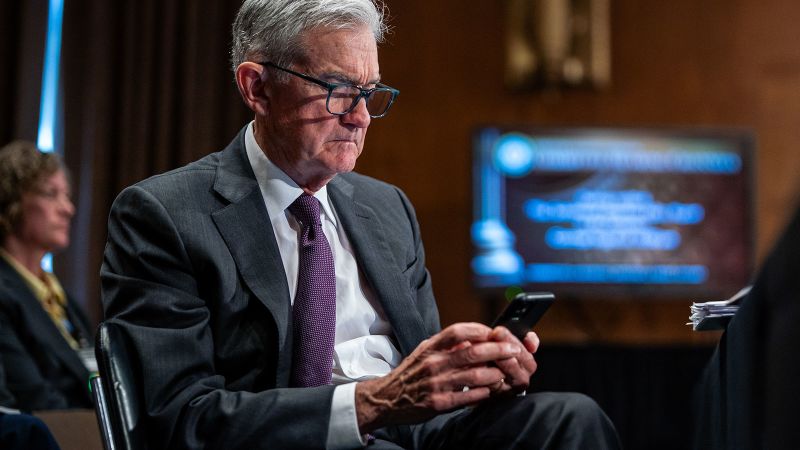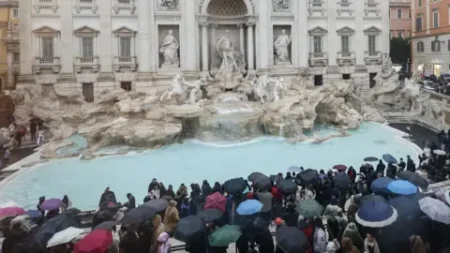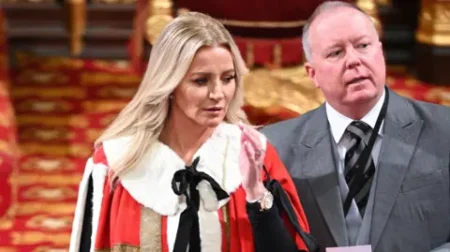In a recent clash of words, Federal Reserve Chair Jerome Powell addressed a letter sent by Russell Vought, the director of the Office of Management and Budget, concerning the Federal Reserve’s renovation of its headquarters in Washington, D.C. Vought had expressed concerns over the management of what he described as an “ostentatious overhaul,” and accused Powell of failing to comply with governmental oversight regulations pertaining to the $2.5 billion renovation project. This project includes essential updates to the historic Marriner S. Eccles Building located on the National Mall, underscoring the tension between fiscal responsibility and necessary infrastructure improvements.
Vought, in his social media post last week, suggested that Powell’s actions might amount to legal infractions, providing him with a deadline of “seven business days” to respond to his queries about the renovation management. The tenor of Vought’s letter is notably accusatory, stating, “The President is extremely troubled by your management of the Federal Reserve System,” and implying that Powell was neglecting his responsibilities regarding fiscal management in favor of unnecessary luxuries.
In response, Powell defended his actions, articulating that both the renovation process and its funding are under thorough oversight from the Federal Reserve’s Board and its appointed watchdog. He clarified that the institution operates independently from the National Capital Planning Commission (NCPC), the federal agency typically in charge of overseeing government construction projects. Powell emphasized that this independence allows the Fed to exercise its own judgment and governance over the renovation initiative. He asserted that, “We have taken great care to ensure the project is carefully overseen since it was first approved by the Board in 2017,” highlighting the meticulous nature with which the renovations have been approached.
Additionally, he indicated that modifications made to the renovation plans were justified adaptations intended to simplify construction processes and mitigate possible delays and cost overruns. He communicated that these changes were not substantial enough to require resubmission of plans to the NCPC. This nuanced response aims to underline the careful considerations taken by the Federal Reserve in ensuring that all renovation aspects were properly managed.
Powell further emphasized the necessity of the renovations he is overseeing, citing significant repairs needed in the buildings, including the removal of hazardous materials such as asbestos, alongside essential updates to outdated systems. Furthermore, he mentioned updates to essential systems — electrical, plumbing, heating, ventilation, air conditioning, and fire safety measures — which are all critical for ensuring the continued safety and functionality of the premises.
Vought’s complaints reflect a broader criticism emerging from other Trump administration officials regarding the rising expenses associated with the Federal Reserve’s building projects. Some observers interpret these financial concerns as a potential pretext for justifying calls for Powell’s removal from his position. Given that Chair Powell can only be dismissed under “for cause,” the tension between President Trump and Powell largely stems from the Fed’s decisions on monetary policy, particularly the decision to maintain interest rates, which contradicts Trump’s desires for lower borrowing costs.
In a recent press briefing, President Trump expressed his disdain for what he labeled as “disgraceful” expenditure, suggesting that spending such an amount on renovations could be seen as grounds for dismissal. He clarified, though, that while he harbors grievances about Powell’s handling of the renovation costs, the likelihood of his termination was “highly unlikely” except under circumstances of significant wrongdoing.
As this story develops, it encapsulates the intersection of governmental oversight, fiscal responsibility, and the inner workings of economic policymaking in a politically charged atmosphere. The disputes between high-ranking officials about the oversight of a significant financial institution like the Federal Reserve continue to raise questions regarding accountability, efficiency, and the power dynamics within the U.S. government. Further updates will shed light on how this saga unfolds amidst ongoing public scrutiny and governmental expectations.











